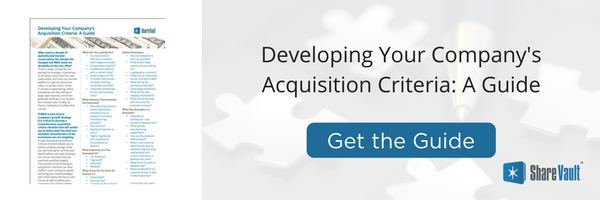5 Actionable M&A Insights From Sharevault’s CEO
03 July, 2020In August of 2019, ShareVault founder and CEO Richard Andersen participated in a web panel hosted by Expert Webcast to share his entrepreneurial expertise in concert with corporate counsel, due diligence and investment banking professionals from Blank Rome, FTI Consulting and DelMorgan & Co.
The discussion focused specifically on the M&A process from the perspective of a private company. The panel examined the pre-transaction stage to closing and post-transaction planning, focusing particularly on deal structuring, due diligence and simplifying the mundane process with the use of technology.
We've synthesized Richard's key takeaways from the discussion into 5 actionable insights you can implement right away. If you'd prefer to watch a replay of the discussion, click here to request the video recording.
1. Get an Early Start
Although entrepreneurs come in all shapes and sizes, most of them share a similar goal: A profitable exit. However, selling a company is not an event; it’s a strategic process that should commence at the earliest stages of the company. Due diligence is not just something that buyers do when evaluating a seller’s company; it is a process a seller should be prepared for early in the formation of the company. We recommend organizing everything a buyer will want to scrutinize—financials, operational data, employee records, customer data, vendor agreements, etc.—in a virtual data room and continuously refine that data room as the company grows and evolves. You never know when a buyer will approach you. Having a data room organized and complete means you’ll be ready and positioned to extract the maximum value from your deal when the time comes. It also builds a strong culture of accountability, and that’s just good business.
2. Get on the Radar of Serial Acquirers
Startups or upstart companies are most often purchased rather than sold. Acquirers usually make acquisitions when they’re ready to buy, not necessarily when the company is ready to sell. This means that putting up a “For Sale” sign on your company may not be the best way to look for prospective buyers. Much more useful is focusing on building relationships with companies over time. You can achieve this by establishing joint development agreements, joint marketing agreements, private label agreements, or reseller agreements. Sometimes the best partnerships are based on purchase orders. Remember that these agreements need to be mutually beneficial to both companies to make sense. Be a good partner, show that your company is fair and easy to work with, and these partnerships will have the potential to grow into acquisitions. Partnering relationships can take years to mature, so practice patience.
3. Fine Tune the Financials
Although an M&A deal may not require the same stringent review process as a full company audit, the financials must be able to survive the scrutiny of a microscope. In fact, the Harvard Business Review reports that according to a number of recent studies, “M&A is a mug’s game, in which typically between 70 and 90 percent are abysmal failures.” Many times, the reason for these failures is that the due diligence process is not broad enough. This is usually the case when the buyer discovers something that the seller either didn’t disclose or didn’t even know. Those red flags are often related to finance and accounting issues. Step into the shoes of a buyer and scrutinize your business the way they would. If there’s a red flag for a buyer, it should be a red flag for you as well. Remediate these issues thoroughly in advance of a prospective exit. That’s not just good deal sense; that’s good business sense.
4. Consider an Investment Banker
Not every M&A transaction involves a sell-side investment banker; however, in many circumstances, the right investment banker can add significant value. When selecting an investment banker, it’s imperative to find one with expertise in your industry and who has substantial experience with similar transactions. Think of investment bankers as individuals. In other words, hire a banker first and a firm second. Like a good lawyer, it’s more about the individual than the firm you’re employing. If that person were to change firms, you would most likely follow them. Also, consider the banker’s relationships with your list of possible buyers. Another critical factor to consider is the compatibility of your deal size with the size of the bank. If you have a small company and hire a large investment bank, chances are your transaction may be assigned to a junior banker and you may not see much of the senior banker who courted your business initially. By picking a firm that’s appropriate for your company size, you’ll find that you’re essential to them and you’ll be more likely to get the kind of service you expect.
5. Don't Be Afraid to Ask Questions
During due diligence, there are a myriad of issues that need to be understood and that often require a lot of back and forth—between the buyer and seller, and among internal teams. Modern virtual data rooms often support a Q&A module, which facilitates and streamlines this process. Rather than relying on emails or phone calls, Q&A modules provide a detailed, moderated thread where questions can be posed and then referred to the appropriate experts. A questions and answers tool allows administrators to efficiently manage issues and avoid time wasted responding to repetitive or redundant questions.
Remember that it’s never too early to begin preparing for the due diligence process. A comprehensive virtual data room is your best bet for ensuring that you’re reaching the most appropriate potential buyers for your company and that you’re providing them with the information that will help them make an informed decision that they’re comfortable making.
Today’s modern virtual data rooms, like ShareVault, provide a due diligence platform that is intuitive, easy to use, completely secure, customizable to your needs, available 24/7, and will help ensure the optimal outcome for your company’s exit.
To learn more about virtual data rooms and the advantages, request a customized walk-through demonstration today!
Want to take ShareVault for your own test drive? Get started by activating your free trial below.
